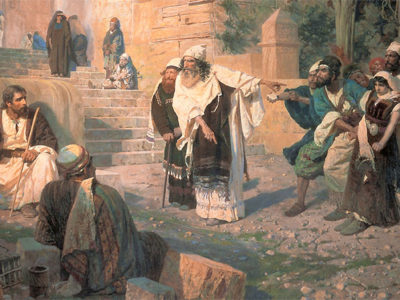STONING WOMEN TO DEATH for adultery, tragically, isn’t old news from ancient history.
It’s breaking news.
At first read of the Bible, it sounds like God approves of this punishment:
“If a man is discovered committing adultery, both he and the woman must die.” (Deuteronomy 22:22, from a law attributed to God)
Really? God wanted people executed for loving their neighbor a little too much?
Not necessarily, many Bible experts say. There was an out, it seems.
Here are a few clues that people convicted of adultery weren’t always executed.
- Little evidence. Scholars can’t find much evidence that Jews carried out the death sentence. It doesn’t show up in their history.
- An ancient precedent for mercy. A law from what is now Iraq, written hundreds of years before God could have given any laws to Moses, also sentenced adulterers to death – but allowed the possibility of mercy. “If a wife is caught having sex with a man who is not her husband, tie them up and throw them in the water. The woman’s husband may save his wife, if he chooses. And the king may save the man” (Code of Hammurabi, Law 129).
- A payoff in Proverbs. There’s a hint in the book of Proverbs that payoffs were a possibility. But one sage warned young men that they shouldn’t count on buying their way out of a husband’s anger: “He will accept no compensation, nor be satisfied with a payoff of any size.” (Proverbs 6:35)
- Murderer buyout prohibited. Jewish law prohibited murderers from buying their way out of a death sentence: “You cannot give someone money to escape the death penalty; you must pay with your own life!” (Numbers 35:31) That suggests people guilty of other capital offenses may have been able to pay a fine instead.
- Jesus didn’t stone anyone. When Jews brought him a woman caught committing adultery, he refused even to condemn her: “I also don’t judge you guilty. You may go now, but don’t sin any more.” (John 8:11)
All of this leaves me wondering.
What was the purpose of God’s law?
Was it intended to beat us down?
Or was it intended to lift us up and point us in the right direction?
And if so, how should that affect what goes on inside our head when we read Jewish laws in the Bible that don’t make much sense to us?





I believe Jesus’ admonition to “go and sin no more” often hides in plain sight in our time. We accept forgiveness and Grace easily enough, but do we strive to the limits of our ability to “sin no more?” I must confess, sometimes I am weak and fail at this. As for the OT teachings, my sense it life and the established societies were much harsher than today and I’ve wondered, did God speak and teach to His people in terms they could understand and relate to? I don’t know, will refer to those wiser than I for the answer to that question.
The “New City Catechism” (free for android and ios) has a great answer to this question — I thought I would share. Love the writers of the past!
Q15. Since no one can keep the law, what is its purpose? Since no one can keep the law, what is its purpose?
Answer: That we may know the holy nature and will of God, and the sinful nature and disobedience of our hearts; and thus our need of a Savior. The law also teaches and exhorts us to live a life worthy of our Savior.
Romans 3:20
No one will be declared righteous in God’s sight by the works of the law; rather, through the law we become conscious of our sin.
Commentary
After God gave the promise to Abraham, he gave the law to Moses. Why? Simply because he had to make things worse before he could make them better. The law exposed sin, provoked sin, condemned sin. The purpose of the law was…to lift the lid off man’s respectability and disclose what he is really like underneath—sinful, rebellious, guilty, under the judgment of God, and helpless to save himself. And the law must still be allowed to do its God-given duty today. One of the great faults of the contemporary church is the tendency to soft-pedal sin and judgment…. We must never bypass the law and come straight to the gospel. To do so it to contradict the plan of God in biblical history…. No man has ever appreciated the gospel until the law has first revealed him to himself. It is only against the inky blackness of the night sky that the stars begin to appear, and it is only against the dark background of sin that the gospel shines forth. Not until the law has bruised and smitten us will we admit our need of the gospel to bind up our wounds. Not until the law has arrested and imprisoned us will we pine for Christ to set us free. Not until the law has condemned and killed us will we call upon Christ for justification and life. Not until the law has driven us to despair of ourselves will we ever believe in Jesus. Not until the law has humbled us even to hell will we turn to the gospel to raise us to heaven.
John Stott (1921–2011). An English Anglican preacher who for many years served as rector of All Souls Church in London, Stott was one of the principal framers of the Lausanne Covenant (1974). His numerous books include Why I Am a Christian and The Cross of Christ.
From The Message of Galatians in The Bible Speaks Today Series (London and Downers Grove: IVP, 1968), 93.
Further Reading Further Reading
“Law in Action” in Concise Theology, by J. I. Packer.